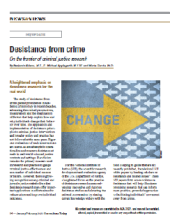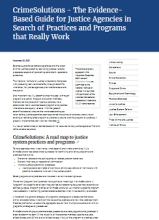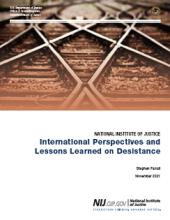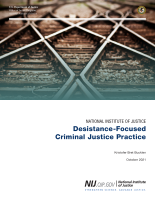Criminal justice systems
Early Representation by Defense Counsel Field Test - Final Evaluation Report - Executive Summary
Microbiome Tools for Forensic Science
Opioids, Race, Context, and Journeys to Crime: Analyzing Black-White Differences in Travel Associated With Opioid Possession Offenses
Desistance from Crime: On the Frontier of Criminal Justice Research
Women's Experiences of Social Reactions From Informal and Formal Supports: Using a Modified Administration of the Social Reactions Questionnaire
NIJ-Funded Research on Mass Shootings to Advance Evidence-Based Policy and Practice
Mass public shootings continue to threaten communities in the United States, yet research on this criminal phenomenon is limited. In this full thematic panel, renowned experts will present a series of research projects summarizing NIJ-funded research projects’ newest findings on public mass shootings. The discussion will focus on NIJ’s investment to address the phenomenon of mass shootings through innovative study approaches to advance our understanding of mass shootings and inform prevention efforts. The implications of this research to criminal justice will also be discussed.
See the YouTube Terms of Service and Google Privacy Policy
CrimeSolutions - The Evidence-based Guide for Justice Agencies in Search of Practices and Programs that Really Work
Desistance From Crime: Implications for Research, Policy, and Practice
Most scholars would agree that desistance from crime – the process of ceasing engagement in criminal activities – is normative. However, there is variability in the literature regarding the definition and measurement of desistance, the signals of desistance, the age at which desistance begins, and the underlying mechanisms that lead to desistance. Even with considerable advances in the theoretical understanding of desistance from crime, there remain critical gaps between research and the application of that research to practice.
See the YouTube Terms of Service and Google Privacy Policy
NIJ Multisite Impact and Cost-Efficiency Evaluation of Veterans Treatment Courts, Fiscal Year 2022
Deadline Notice
The deadline for the funding opportunity discussed in this video has passed.
See the YouTube Terms of Service and Google Privacy Policy
Chatbots in the Criminal Justice System
THE TULALIP TRIBAL JUSTICE SYSTEM: A PATH TO WELLNESS
Racial/Ethnic Differences in Alcohol and Drug Misuse Among IPV-Victimized Women: Exploring the Role of Difficulties Regulating Positive Emotions
Assessing best practices in crime labs structure, processes, and performance: A partial test of Gagliardi's 13 Critical tasks
A Longitudinal Examination of the Association Between Intelligence and Rearrest Using a Latent Trait-State-Occasion Modeling Approach in a Sample of Previously Adjudicated Youth
Breaking the School-to-Prison Pipeline: Implications of Removing Police from Schools for Racial and Ethnic Disparities in the Justice System
Strengthening data-driven pretrial release in New Jersey
Evaluating Bioinformatic Pipeline Performance for Forensic Microbiome Analysis
International Perspectives and Lessons Learned on Desistance (Executive Summary)
Desistance-Focused Criminal Justice Practice (Executive Summary)
NIJ Funded Research on Firearms Violence in Urban Cities: Advancing Scientific Evidence to Inform Practice
Using Data and Science to Understand the Impact of COVID–19 on Corrections
Desistance From Crime: Implications for Research, Policy, and Practice





